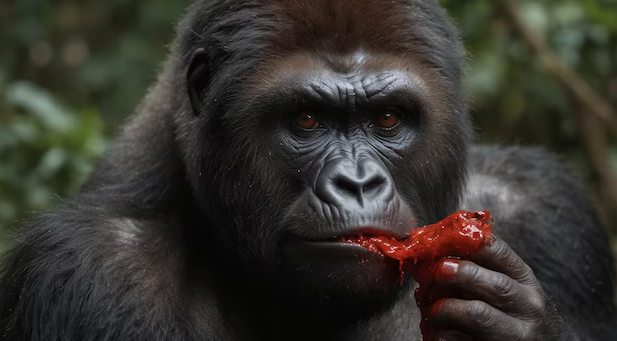Introduction to Gorillas and their Diet
Gorillas, the gentle giants of the primate world, have captivated our imaginations for years. With their expressive faces and strong social bonds, they are often seen as symbols of strength and community. But what about their diet? Most people associate gorillas with a plant-based lifestyle filled with leaves, fruits, and stems. However, there’s an intriguing question that lingers: do gorillas eat meat? This inquiry takes us deep into the jungle to explore not only what these magnificent creatures consume but also how their eating habits reflect their environment. Join us on this journey as we uncover the truth behind gorilla diets and whether or not they indulge in a carnivorous snack from time to time!
The Debate: Do Gorillas Eat Meat?
The question of whether gorillas eat meat sparks considerable debate among researchers and wildlife enthusiasts. Traditionally viewed as herbivores, these majestic primates primarily consume leaves, fruits, and stems. However, some studies suggest they occasionally partake in animal protein.
Field observations have documented rare instances where gorillas scavenge or hunt small animals. Such behaviors challenge the perception of their strictly plant-based diet. Yet these events appear infrequent.
Some argue that this occasional consumption may be driven by nutritional needs or environmental pressures. Others maintain that it’s a reflection of opportunistic behavior rather than a dietary requirement.
Understanding the complexities of gorilla diets requires further research into their natural habitats and social structures. The nuances in their feeding habits paint a more intricate picture than once believed.
Factors That Influence Gorilla Diet
Gorillas have a diverse diet, influenced by various factors in their environment. One significant aspect is the availability of food sources. They primarily consume leaves, stems, and fruits, but seasonal changes can affect what’s accessible.
Social structures within gorilla groups also play a role. Dominant males may dictate feeding locations and times, impacting what others eat. Hierarchies influence access to prime foraging areas.
Additionally, geographic location matters. Different species of gorillas inhabit distinct ecosystems with varying flora. Mountain gorillas often rely on tougher vegetation compared to lowland types that enjoy more fruit.
Environmental pressures like habitat destruction or climate change can alter food availability. These changes push gorillas to adapt their diets accordingly in search of sustenance.
Studies and Observations of Gorilla Meat Consumption
Research on gorilla meat consumption has revealed intriguing insights. While primarily herbivorous, some studies have reported instances of gorillas consuming small amounts of animal protein.
Field observations indicate that certain groups might occasionally hunt or scavenge insects and small animals. These behaviors are not widespread but do occur in specific contexts.
For example, young male gorillas may exhibit curiosity towards the carcasses of deceased animals. This exploratory behavior suggests a potential for opportunistic feeding rather than a regular dietary choice.
Additionally, genetic analysis shows that some populations adapt their diets based on environmental availability. Such flexibility highlights the intelligence and adaptability of these primates in response to changing habitats.
Researchers continue to monitor these patterns closely to understand better how social dynamics influence what gorillas choose to consume beyond their standard plant-based diet.
Gorillas as Opportunistic Meat Eaters
Gorillas, primarily herbivorous by nature, are often perceived as strict plant eaters. However, their dietary habits can be more complex than they appear.
In certain environments, gorillas have been observed consuming small amounts of meat. This behavior is not the norm but occurs opportunistically. When faced with limited food sources or during specific seasons, they may scavenge insects or even hunt smaller animals.
Observations in the wild reveal that these instances are rare and typically involve young primates or rodents. The decision to consume meat seems driven by necessity rather than preference.
Interestingly, this adaptability showcases gorillas’ ability to respond to changing conditions in their habitat. It’s a testament to their survival instincts rather than an indication of a carnivorous lifestyle. As intelligent beings, gorillas demonstrate flexibility in their diet when circumstances call for it.
Ethical Considerations of Feeding Meat to Gorillas in Captivity
Feeding meat to gorillas in captivity raises significant ethical questions. Gorillas are primarily herbivorous, and introducing animal protein into their diet can disrupt their natural behaviors and health.
Captive environments often lack the same complex ecosystems found in the wild. This can lead to issues like obesity or digestive problems when gorillas consume diets not suited for them. It’s essential that caregivers prioritize species-appropriate nutrition.
Moreover, there is a growing concern about how captive animals experience stress related to diet changes. Observing gorillas in their natural habitats shows they rarely hunt or scavenge for meat; this instinct isn’t present as strongly among those raised in zoos.
Understanding these nuances helps ensure that we respect the biological needs of these magnificent creatures while promoting their well-being. Ethical feeding practices should always align with preserving a gorilla’s innate behaviors and instincts.
Conclusion:
Gorillas are fascinating creatures with complex dietary habits. While they primarily thrive on a vegetarian diet, the question of whether gorillas eat meat sparks curiosity among researchers and wildlife enthusiasts alike.
The debate surrounding their potential meat consumption is ongoing. Some argue that gorillas strictly adhere to a herbivorous lifestyle, while others present evidence suggesting occasional carnivorous behavior. Various factors influence what these magnificent animals consume, including environmental conditions and food availability.
Studies have shown that there are rare instances of wild gorillas consuming insects or small vertebrates. These occurrences demonstrate an opportunistic side to their feeding behaviors rather than a full commitment to meat-eating as part of their regular diet.
In captivity, ethical considerations come into play regarding the introduction of meat into gorilla diets. Many zoos strive to replicate natural habitats for these primates and typically avoid offering meat due to its deviation from their natural dietary preferences.
Understanding the complexities behind “do gorillas eat meat” helps illuminate not only their eating habits but also broader ecological dynamics within their habitats. As we continue exploring these remarkable animals, it’s important to appreciate both their primary herbivore status and the nuances of their occasional omnivorous tendencies in certain contexts.


